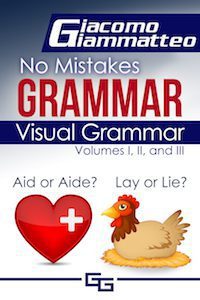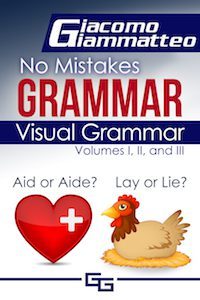
Jim Giammatteo, indie author of over 70 books, puts spellcheckers and grammar checkers in their place
While there's no doubt that spellcheckers have improved over the years, they are still no substitute for a human editor, no matter how tight an indie author's budget. Jim Giammatteo explains why we should resist the temptation to use them as a substitute – though they have their uses.
I'm writing this hoping it will inspire people to reconsider their decisions if they had elected to forego an editor in favour of a spellchecker. Why? It's a bad idea.
Don't get me wrong; I love spellcheckers. I think they're great and getting better. But that last statement says it all: getting better. In other words, they're not there yet.
They miss mistakes and point out things as being wrong that aren't. You can't trust them. Some of the worst mistakes pop up due to the misuse of words—especially homonyms—and spellcheckers won't find them.
Without further ado, let's take a look at what these applications will and won't do for you.
The Good and the Bad
Speed
Spellcheckers are outstanding at scanning a vast amount of text and listing words that are spelled wrong. Most of them even provide a list of suggestions for the proper word, allowing you to simply click on the word to replace the wrong one.
They do it so fast that it would be impossible for a human being to compete with the speed. It would be impossible to compete with the accuracy as far as it goes, but that's saying a lot. You may think it would be easy: compare the text to what's in the dictionary and display anything that's wrong. The problem, or one of the problems, is that many dictionaries disagree with each other.
Consistency
As an example, take the word “barcode.” If you check Merriam-Webster, you'll see it listed as “bar code” (two words), with “barcode” as a variant. The Oxford English Dictionaries lists it as one word, as does Dictionary.com, but vocabulary.com lists it as two words.
That's four dictionaries with two of them showing “barcode” as one word, and two showing “bar code” as two words.
Change
Another problem with spellcheckers is when rules change, as in the case with “themself.” Prior to last year, the use of themself was frowned upon, and it is almost always flagged by spellcheckers as being wrong. But CMOS (Chicago Manual of Style) says it is now all right.
At the Copy Editors' annual meeting, the Chicago Manual of Style editors touched on the use of themself in their conference presentation, saying the 17th edition is going to say it’s OK to use the word themself if that’s your preference.
It used to be that in a sentence like the following one, the proper word to use would be themselves even though it was referring to a singular pronoun.
- Tell whoever calls they can pick up the package themselves.
Now, according to CMOS, it's okay to say:
- Tell whoever calls they can pick up the package themself.
This took place more than a year ago, yet the spellcheckers still flag themself as inappropriate. It did it with this piece of writing when I ran it through spellcheck.
Errors
The examples above don't constitute the extent of the problem. Spellcheckers consistently flag the word “else's” as being wrong as in the following sentence.
- That blue Chevy is someone else's car.
Not all spellcheckers will flag it, but some will highlight the word “else's” and flag it as not being standard spelling.
Homonyms
Aside from the few issues we've already touched on, the big issue is dealing with homonyms. I know that most writers will claim they know the difference between words and when to use each, and I don't doubt that. The problem is no matter how well versed you may be in grammar, the occasional slip will happen. If you're typing fast, its easier then you think to mess up and type “it's” instead of “its” or “than” instead of “then.”
The big problem is that when you make an error like that, the spellchecker won't flag it because they're real words, just not used properly.
(I will assume you noticed I slipped in two of those very mistakes in the previous paragraph, and when I ran the spellchecker it said all was fine. “… its easier then you …” should have read “… it's easier than you…”)
No problem, you say. I”ll use a grammar checker. To check that out, I ran that paragraph through Grammarly. Here are the results:
- It did its job and caught the misuse of “its” instead of “it's.”
- It did not catch the misuse of “then” instead of “than.”
- It flagged the following sentence as being wrong, saying it needed a semicolon after the word “grammar.”
The problem is no matter how well versed you may be in grammar, the occasional slip will happen.
ProWritingAid, a competitor to Grammarly, found both of the errors and did not point out any other problems.
Other homonyms that many people have problems with are the following:
- advise/advice
- loose/lose
- passed/past
- dessert/desert
- weather/whether
- then/than
- site/sight/cite
- Compliment/complement
- Lose/loose
- Council/counsel
- Their/they're/there
- your/your're/yore

One of Jim Giammatteo's extensive “No Mistakes” series
There are hundreds more, but we don't have time to list them all. I cover most of them in my book Visual Grammar, or you can opt to check out any specific words in one of the No Mistakes Grammar Bites books. You can see all my books here or go to any of the major retailers online and search by author name or book title.
Capitals
Spellcheck doesn't catch a lot of capitalization errors, and it usually flags acronyms, abbreviations, and technical terms as being spelled wrong. You can fix that by entering them in the spellchecker's dictionary by clicking “learn” or “add to dictionary,” but it's something you'll have to do manually.
Plurals
Spellcheck also fails in those instances when you forget to pluralize a word. Suppose you meant to say “The bananas are on the counter,” but you forgot the “s” after “banana.” Now, the sentence not only carries a different message, it is also grammatically wrong because of the subject/verb agreement. “The banana are on the counter.”
A spellchecker wouldn't pick up on that. I ran it through both grammar checkers, and they both caught the error, but the spellcheckers didn't.
Last Word on Spellcheckers
This is From the Grammar Advice Blog:
- “Spell check will not fined words witch are miss used butt spelled rite!”
That's a great sentence, and it shows how bad a spellchecker can perform, but nothing shows failure better than the oft-cited poem, “Ode to the Spell Checker“.
#Indieauthors - don't think a spellchecker can replace a human editor! @JimGiammatteo explains why that would be a false economy. #ww #writingadvice Share on XIn summary, spellcheckers are great at what they do for the most part, but they're not something you can rely on to catch all of your mistakes.
RELATED POSTS ABOUT GRAMMAR AND PUNCTUATION
From the ALLi Author Advice Center Archive





That’s hilarious.
I remember reading the transcript of the deposition of a medical expert in a medical malpractice case. The case arose from the contamination of a wound during surgery, which allowed undesirable organisms to enter the wound site and cause a dangerous infection.
The medical expert went on at great length regarding the propensity of organisms entering the body in such manner to proliferate and cause all sorts of headaches.
The deposition transcript was interesting, and the expert very persuasive.
The problem with the transcript is that every time the expert used the word ‘ORGANISM’, the transcriptionist left out the central ‘NI’.
I was the only one who caught the error.